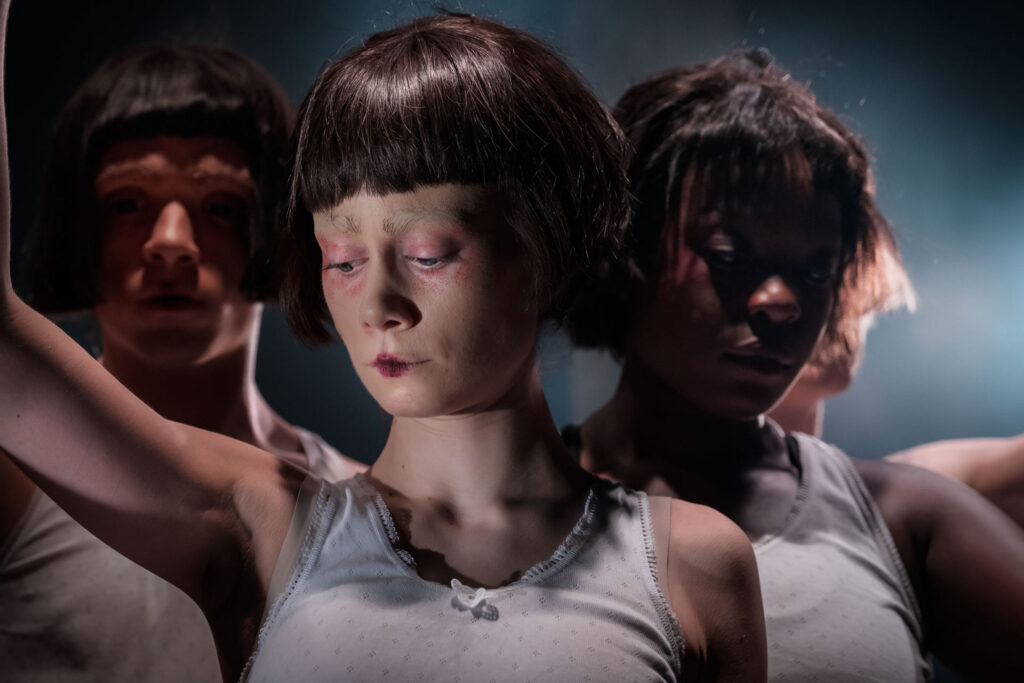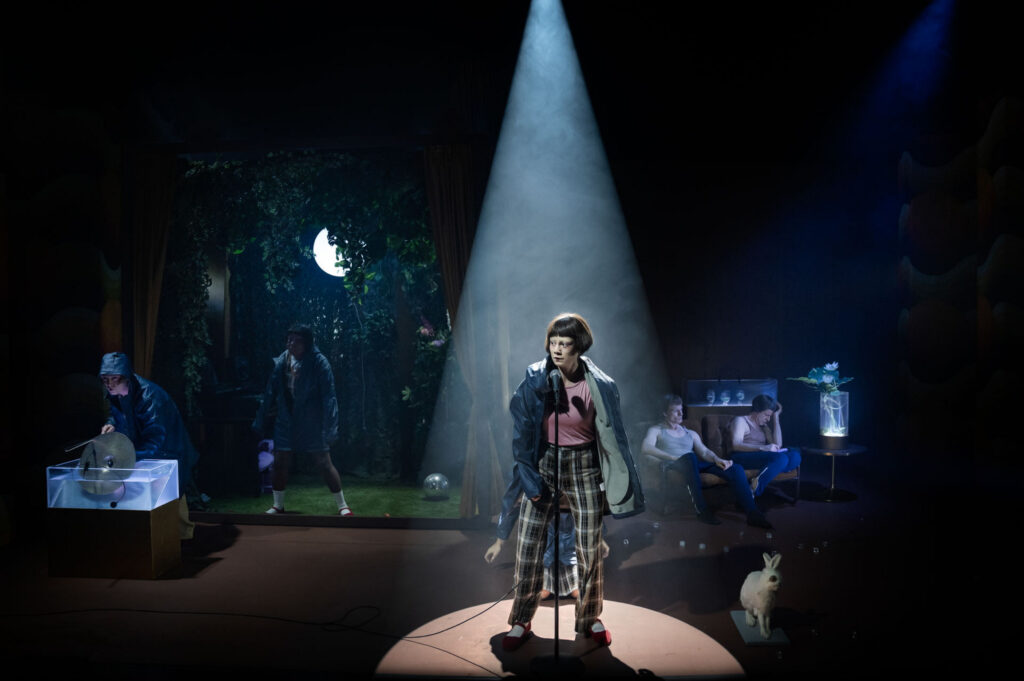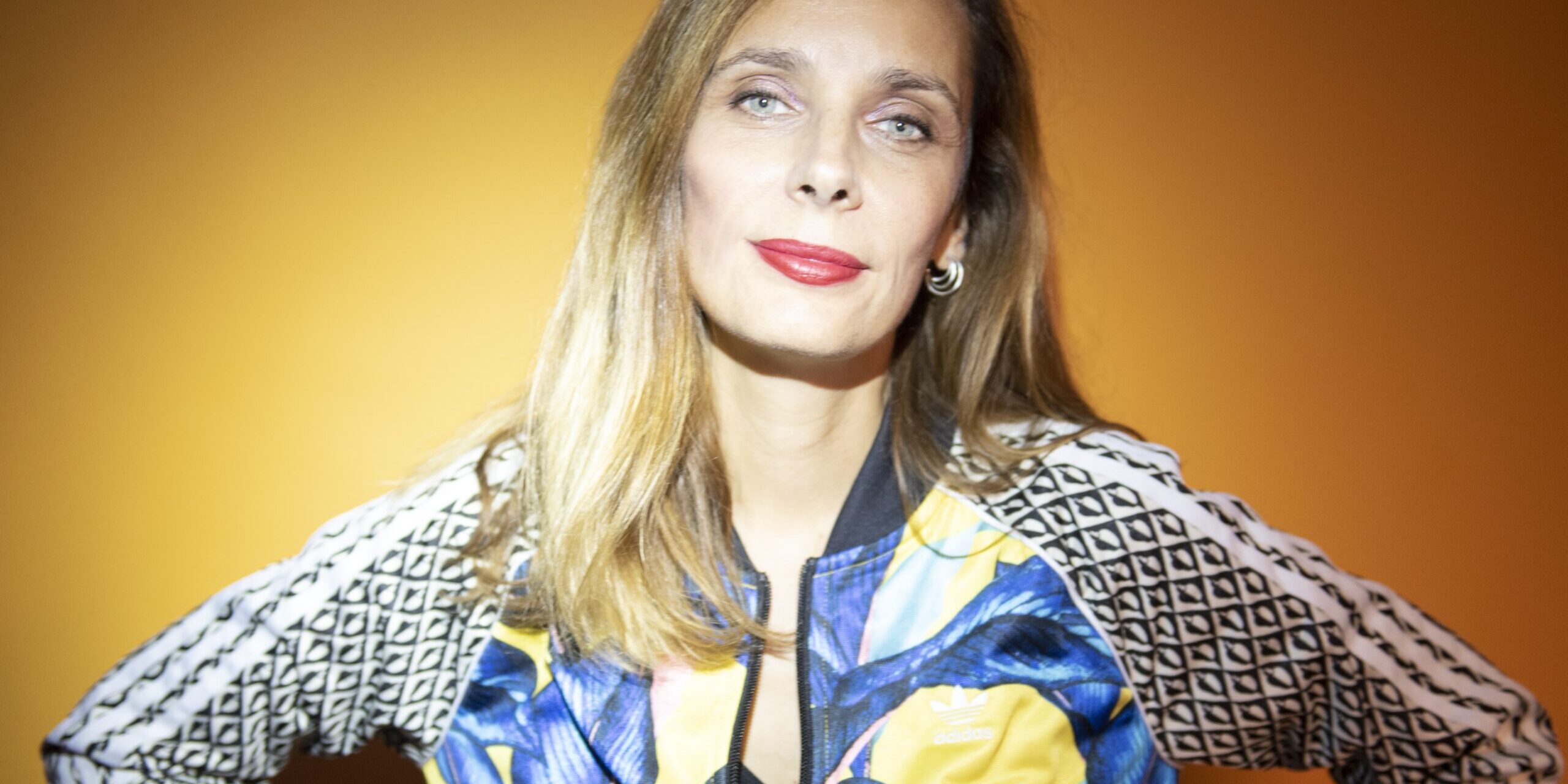Theatre director and former curator of BITEF Anja Suša talks to Nick Awde about #Jeanne, her radical reboot of the story of Joan of Arc, the reality of working as a theatre artist in Sweden and why we still need heroes.
We always need heroes and leaders no matter their genesis, but when these two qualifications converge in a single candidate, we’re not always sure how to accept them. Without society’s sustained support, for example, a hero/leader can turn into a martyr overnight as the pressure piles up and it all goes horribly wrong – which happens to be the spark for #Jeanne. More a reboot than a simple retelling, the play loads up the Joan of Arc mythos to fuel a co-exploration of global inequality and climate crisis as things burn metaphorically and literally around us.
The setting is a frozen lake that separates two worlds: the north shore lined with luxury villas and private quays, the south shore dominated by a high-rise apartment block and a lift that’s forever out of order. It’s here in the south that a young girl rebels against the status quo and crosses the lake to grab some of the north shore’s wealth for her side and redress the imbalance. The resulting clash reveals how we shape our heroes/leaders and, if they also come bearing a message, questions why we shoot the messenger.
“I think it’s awesome that this is a show that has been performed at Dramaten,” says director Anja Suša. “It’s the Royal National Theatre but at the same time it has been presenting in recent years a lot more cutting-edge theatre in alternative spaces than you would expect within the Swedish context. So nothing is simple here with this production, and that goes for our way of working on it and also the way of its reception.”
#Jeanne is a commission from Sweden’s biggest touring company Riksteatern (National Swedish Touring Theatre) and co-produced with regular partner Dramaten. For its shows, Riksteatern first presents a press show after which they tour around most of Sweden. In #Jeanne’s case the play travelled to Finland before returning to do ten shows at Dramaten and then on to BITEF 2023 in Suša’s hometown of Belgrade.
The origin story certainly hasn’t been a simple one. The initial idea came from Dritëro Kasapi, Riksteatern’s artistic director for theatre. As Suša recalls: “We started talking in the autumn of 2019 before the pandemic when Dritëro suggested coming up with a new work that would deal with the notion of heroism and heroes and what they mean in contemporary, mainly western society, and why we need them. Somewhere in the back of his mind was this idea of Greta Thunberg being Swedish and so linking into the whole climate activist movement.”

#Jeanne. Photo: Markus Garder
It got them thinking about young women sacrificing themselves for bigger ideals, and so the logical next step would be writing a contemporary version of the Joan of Arc story. “But I immediately rejected that because of all the theatre and film adaptations we already have, some quite recently in Swedish theatres. If we kept it super close to the historical narrative of Joan of Arc there wouldn’t be much left for us to actually talk about.”
Suša’s solution to the puzzle was to bring in Ivana Sajko, a Croatian playwright based in Berlin whom she has known for years and whose work she follows closely. “I had full trust that she would be a perfect person for the task because I knew that the last thing Ivana would do would be to write yet another contemporary version.”
Their next steps were halted by the pandemic and Sweden’s cultural institutions all shut down – a baffling move since this was one of the most liberal countries for pandemic restrictions. The hiatus ended up giving Suša and Sajko more time to think. “We started off with the usual procedure of studying all the historical resources, all the traditional plays and films. We were very soon convinced that this was not the way. Yes we can borrow ideas from the original Joan of Arc, but what bothered us was her religious fanaticism as well as her strong nationalism. These have been justified in various ways, especially in the Romantic versions like Friedrich Schiller’s The Maid of Orleans or in films like Carl Dreyer’s The Passion of Joan of Arc, where different pieces of her narrative were used for different purposes relevant to the various periods.
“But even though we knew we needed to find something else, we were impressed with this notion of heroism and why we still need heroes or someone similar to lead us into social or political change or paradigm change of any kind. And, long story short, that’s all we took from the text.”
The pair’s attention turned to the global climate crisis because this is where the real political battles of today are gravitating. Ecology also poses a social challenge, which then becomes a class issue because climate issues highlight the divisions between the rich and privileged and those who are not – not only on a country by country basis but also within each country’s society.
“We thought if we take climate change and spin it in a way that it’s a burning social issue which we take to the political arena, and somehow tell the story of Joan of Arc using those optics… then we were onto something. So Ivana sat down and wrote the text – and because she has a unique style that spans from dramatic writing to almost poetry, the result was a very unique text.”
With the end of Covid restrictions, rehearsals finally started in January 2023 (opening in March) where Suša workshopped the Swedish cast to develop the production concept – a process that proved to be intense and rewarding, she says. For example, English features in the Swedish text thanks to David Attenborough’s Planet Earth series which the main character watches. It’s taken to another level by interpolating content delivered by an Attenborough avatar created via a deepfake app.
“The actors devised text through the workshop process where they would be given a certain topic and we would do rounds of improv over and over again for a month or so. We then collected those texts. Of course Swedish is their first language but all the actors speak very good English – they would make a mistake here and there and we kept all the mistakes. So we now have David Attenborough with not so perfect English who has become a thread through the show – he has this soothing voice that generations can identify with, universally recognisable in so many different contexts.”
While Suša speaks Swedish – she teaches theatre directing at Stockholm’s University of the Arts – Sajko doesn’t and so she wrote her original draft in Croatian, meaning that the responsibility fell on Suša to ensure that nothing would be lost in translation. “There is something about Joan of Arc, she’s one of the core narratives of the Western European civilisation, you will hardly find anyone in any European context who isn’t at least a little bit familiar with the basic story. This is something we counted on when we created this transposition which was not only linguistic but also a cultural transposition.”
Writer and director were also in agreement that even though Greta Thunberg is prominent in her native Sweden, they would not risk creating a play that ended up “one-on-one Greta”. Instead, like Joan, like Attenborough, they set out create a text that exists in between all of these universally recognisable references, because Greta is such a globally known personage. The script is not so literal in its characterisations therefore, but borrows from Thunberg’s vision and actions.
The staging draws on a range of references, some from the Swedish context, while the main visual inspiration comes from the Serbian painter Biljana Đurđević. “Her work has always been important for me and I’ve been thinking for years about finding a good context to implement some of her visuals that resonate with me strongly. And then suddenly it just fell into my lap with this project.”

#Jeanne. Photo: Markus Garder
With text, visuals and context forming such an apt vehicle, it’s surprising that Suša doesn’t see getting across the big ideas as a priority. “I never really start with a message that has to be delivered. Rather, it’s a puzzle for me when I first start working on something, and I want to keep it a puzzle even when I’m done. At the end of the day, it boils down to the question, what can theatre really do? In the case of #Jeanne, it is us being self-referential because while we are dealing with the story of Joan of Arc, we are also dealing with the story of us telling this story and asking who are we? Theatre is one of the last bastions of privilege, it’s like a gatekeeper of bourgeois culture, especially in contemporary capitalist society where this division exists between different classes. We all live in a class-based society – it’s just that in some societies this division is more visible.”
Suša admits that not planning any particular impact for the play’s themes meant that this created uncertainty about the director’s job of transferring script to stage. “I had my fears because this could have easily been one of those plays that is good on paper but almost impossible to stage. Ivana was thinking the same and there was even a point three weeks into the rehearsal process when she suddenly said, ‘Oh my god, I just read the play again, how can you even direct this?’ That was a very good question, and I guess not even I knew how I was going to direct it at that point.
“So I have been lucky to work with such an open-minded ensemble. The actors have played along so well with things likes the David Attenborough interventions based on their improvisations, developing the subject of heroism and questioning how we can even speak about the world collapsing from a mere theatre stage.”
If she had to boil it down to a message, then this would be it. The story of the climate crisis was never far from the project and creatives and cast were aways borrowing bits and pieces from the issue. But the central interest lay in their own position in terms of how theatre can play a part in the big social and political discussions while being typically self-referential and, more often than not, speaking to an audience that shares the same attitudes.
“I got a question from a Serbian journalist when I announced the BITEF performance. They asked me how hard is it for my leftist ideas to find an understanding within the Swedish context? And I was, well sometimes it’s easier than it ever was in Serbia. Because we all agree that most theatre artists around the globe, especially in Western civilisation, would define their political position as closer to the left politically than to the right.”
Sweden takes that further thanks to the idea of ‘allmänhet’ – the closest translation is ‘the public interest’ , something shared by everyone in the country. In that spirit the Swedish theatre system was formed around highly social-democratic models emerging from the 1960s and 70s under the umbrella of the welfare state. As a result, Swedish theatres are subsidised and well maintained with the mission of working with the concepts of public welfare and accessibility.
“Basically it’s a big theatre culture here where even the smallest children are regularly taken to theatre. Unfortunately Sweden has changed – it’s not the same country anymore and the whole welfare concept has deteriorated rapidly – and yet theatre still lives in its own bubble. This is to explain what it means to be a theatre artist in Sweden. It means that you are almost by definition regarded as somebody who comes from this concept of welfare or commonality and speaks on its behalf through the theatre. I cannot imagine a right-wing artist doing anything in theatre in Sweden at this particular moment in time. Maybe it’ll come, who knows, but right now it doesn’t exist.”
The point therefore is that everything may seem cosy and secure but, says Suša, it brings you to the position where you’re knocking on an already open door, addressing people with the same views and thoughts. “How can we even aim at being political when we all agree about everything from the very first line?”
#Jeanne’s answer comes on many levels, much of it drawn from the materials that were coined or developed with the actors throughout the working process, and where humour turned out to be a key device. “When I was creating what I call the ‘universe of the performance’, I showed videos of Forced Entertainment shows to the actors because I wanted them to get to the right frequency to be able to be cynical and self-ironic. I think it worked. Combined with elements like the voice of David Attenborough, it has produced a whole universe of the performance that sees us operating on the frequency of deep melancholy but also a sense of absurdity with a pinch of humour – and this makes #Jeanne as much a journey for the spectator as it has been for us.”
#Jeanne will be performed at Terazije Theatre, Belgrade on 9th October at part of BITEF.
For tickets and more information, visit: festival.bitef.rs
Nick Awde is a journalist, playwright, editor, critic and producer. Based in the UK, he is co-director of Morecambe's Alhambra Theatre. Books include Equal Stages (diversity and inclusion in theatre), Mellotron, Women In Islam, and translations of plays by other writers. Much of his work focuses on ethnoconflict and language/cultural genocide.








